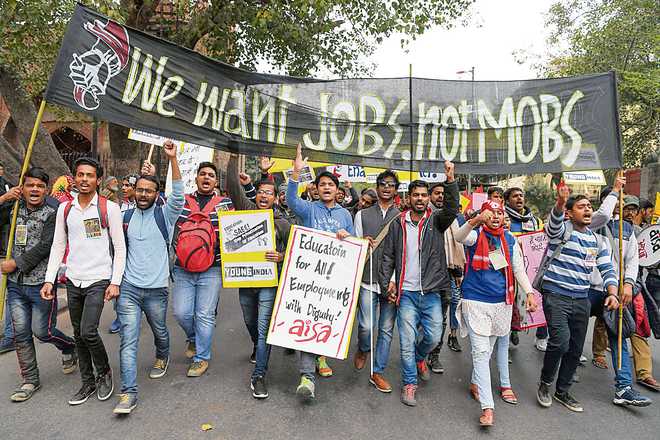
Roadblock: The market is not allowing life-affirming education to evolve.
AVIJIT PATHAK
Professor of sociology at JNU, New Delhi
Possibly, the spirit of being young is to dream, experiment, raise critical questions and strive for a better world. As around this time in the year some of them would enter an important stage of life by joining colleges and universities for higher learning, I wonder whether education could equip them with the politico-ethical and pedagogic sensitivity to overcome the prevalent culture of violence in our society, and move towards sanity as a state of being and consciousness. Can they arouse hope? I ask this question because the deeper meaning of education is not merely the mastery over expertised academic knowledge or acquisition of techno-professional skills for joining the industry; it is essentially a profound art of seeing, relating, living and doing things. The aesthetics of education, we should not forget, is no less important than its instrumental aspect.
In these ‘pragmatic’ times — driven by the market-induced desire for ‘placement and package’, and associated traders of ‘knowledge’ encouraging the proliferation of education shops — it is not easy to assert the need for linking life-affirming pedagogy and emancipatory quest. Yet, as teachers, we should not give up, and at least try to tell the youth yet another story of education — the story of Freire and Tagore, and Gandhi and Marx. It is in this context that I wish to raise three critical issues.
First, education remains incomplete unless it enables one to probe into the social context of learning. And this is not merely a dispassionate theoretical understanding; this ought to inspire one to resist the prevalent pathology, unite theory and practice, or thinking and doing, and strive for a just/humane society. Hence, the all-pervading violence in our society ought to be understood and then overcome. Violence, be it physical/brute, psychic/symbolic, economic/cultural, seems to have surrounded our existence. The might of majoritarianism, the brutality of hierarchy implicit in a caste-ridden/patriarchal society, the mental cleavages the heightened economic inequality generates, the aggression of ecologically destructive consumerism, the celebration of hyper-masculine nationalism and militarism, the insensitivity associated with the media simulations of the glossy culture industry, and the decline of morally sensitive communities in the age of anonymity and surveillance —the reasons for violence are many.
Under these circumstances, it is easier to normalise the psychology of violence. No wonder, we allow the metaphor of war to define almost every sphere of life. Children are ‘exam warriors’; India defeating Pakistan in cricket is no less than a ‘surgical strike’; harshness is ‘smartness’, and softness is weakness! In a society of this kind, even education is corrupted. The obsession with ‘success’ measured through material wealth and administrative power, the standardisation of ‘ambitions’ in life, the fear of carrying the stigma of ‘failure’, the internalisation of competitiveness and social Darwinism, and the breakdown of a dialogic relationship between the teacher and the taught: the domain of education has become toxic; it does not soften the mind; instead, the youth grow up with stress, anxiety and violence.
Second, the meaning of education is becoming increasingly narrow and fragmented. With the sole emphasis on ‘skill learning’ (dissociated from culture, ethics and philosophy), technical education and instrumental knowledge, we are preventing the youth from becoming open and sensitive to the most important domains of life — particularly, the faculties of empathy, reflexivity and communion.
Empathy enables one to break the walls of separation, and understand others. It is different from the coldness of ‘objectification’ — the Baconian urge to equate knowledge with the power to dominate and control nature. It is art — say, a story by Tagore, a poem by Blake, a painting by Leonardo — that sharpens this understanding. And life becomes artistic when with empathy we expand our horizons and understand others. Likewise, reflexivity is the human sensitivity to invoke the ‘self’ of the learner, and relate to the world more deeply, intimately and compassionately. This is not like the Cartesian duality of body and mind. This is to understand the world with pain and suffering, and love and longing — say, the way Gandhi understood Noakhali in 1946. And eventually, this leads to the spirit of communion — the meeting ground of the knower and the known, masculine and feminine, and object and subject. And then, learning becomes ecological. Science finds its poetry; history becomes intimate; literature becomes the ethnography of everyday life, and engineering becomes a creative balance between the creativity of human agency and the rhythm of the natural system.
Third, the market doesn’t allow this life-affirming education to evolve. Dialogic pedagogy is replaced by the cult of ‘measurement’ and ‘productivity’ the emergent techno-managers as Vice-Chancellors and policy-makers impose; education becomes mere training for a job; science becomes soulless objectification of nature; teachers become service providers; and students are transformed into consumers of skills. Education does not liberate the youth. Instead, with the burden of knowledge, the ‘products’ of the learning machines become violent, narcissistic and egoistic. Those who strive for a better world, ask fundamental questions and seek to experience education as a life-transformative therapeutic process, are condemned as either dreamy idealists or misdirected radicals.
As a teacher, I ask myself; should we lose hope? Or is it possible for us to invite the youth to the domain of higher education, and inspire them to realise that if wisdom disappears, no skill or technique can take them to a world free from violence, hatred and psychic poisoning.



























